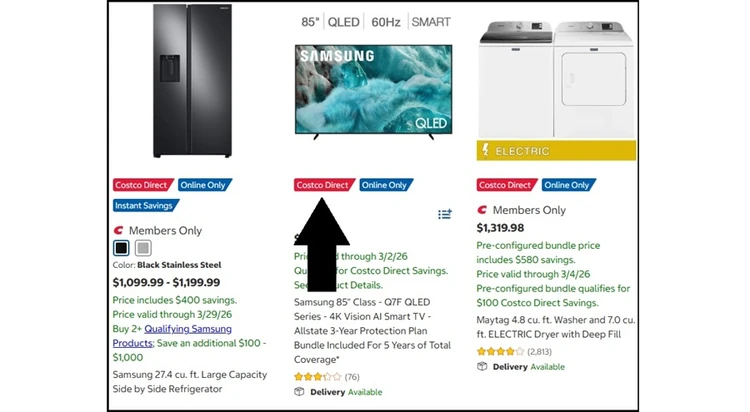Looks like Apple, smells like trouble
-
Scammers are using AI to clone big brands (Apple, Coach, Nintendo, etc.) with fake sites, emails, and ads during holiday deal season
-
Email and website are surging, and nearly half of shoppers have seen fake celebrity or influencer endorsements
-
Stay safe by going directly to official sites, double-checking unfamiliar retailers, using scam-protection tools, strong passwords/2FA, and trusting your gut if something feels off
As holiday shopping starts to ramps up, it brings scammers out of the woodwork looking to take advantage of deal seekers. New research from McAfee Labs shows just how aggressively cybercriminals are copying trusted brands online and how easy it is for rushed shoppers to mistake a fake website, ad, or email for the real thing.
From webpages touting fake Apple products to bogus Coach outlet sites, brand impersonation has become one of the biggest risks of the 2025 holiday season.
The brands scammers copy the most
Here are the luxury brands most likely to be impersonated (in order):
- Coach
- Dior
- Ralph Lauren
- Rolex
- Gucci
And here are the consumer brands most likely to be impersonated (in order):
- Apple
- Nintendo
- Samsung
- Disney
- Steam
No surprise that the list includes brands selling handbags, sneakers, watches, hot tech, gaming consoles, streaming, and gift cards. All stuff that shoppers are always searching for in November and December.
Scammers know this, and so they lean hard into AI to create lookalike branded websites, holiday sale graphics, and limited-time deals designed to get you to enter payment info before you think too hard about it.
Coach stands out among luxury brands, with significantly more scam-related URLs than other high-end names.
On the consumer side, Apple leads the pack as shoppers are always on the hunt for deals on a new MacBook or iPhone.
Apple is followed closely by Nintendo, Samsung, Disney, and Steam, all of which are tied to popular devices, games, or digital services.
How big is the problem? The numbers behind the
McAfees latest findings paint a clear picture of how fast impersonation are growing as the holidays approach:
- Email are sharply higher these are up about 50% in retail and 85% in tech. The bread-and-butter email you should watch out for include fake shipping notices, password resets, and account alert messages. If you get one, dont trust it and never click a link in the email. Instead, go to the website itself, if the message is real, youll find it there.
- Fake websites are on the rise technology brand URL are up nearly 50%, and consumer brand URL are up about 5%. Criminals are constantly publishingvery convincing fake websites, hoping you'll buy without thinking and hand over your credit card or bank information in the process.
- Unfamiliar ads are everywhere 91% of consumers say theyre seeing ads from retailers they dont recognize, and 37% may buy from brands they dont recognize. Yes, you read that correctly, over 1 in every 3 shoppers will consider buying from a brand or site theyve never heard of.
- AI is reshaping scam tactics 46% of Americans say theyve encountered fake celebrity or influencer endorsements. This is when scammers use AI to pair an actor, musician, or athlete with a fake limited-time deal or bogus product page.
How to protect yourself while you shop
McAfees research serves as a warning to shoppers and it also points toward simple ways to stay safer without giving up the savings:
- Go to the source, not the link. If you get a text, email, or social ad about a deal, resist the urge to click on it. Instead, always open your browser or the brands official app and search for the deal there.
- Be extra cautious with unfamiliar retailers. An amazing price from a website youve never heard of deserves an extra look. Be sure to look up independent reviews, check how long the sites been around, and look for a phone number or physical address.
- Watch for classic red flags. Site is in a different language, pressure to act immediately, demands for payment via gift cards or wire transfers, or requests for sensitive information are all major warning signs.
- Turn on scam protection tools. Many security programs now scan links and URLs in real time and can warn you before you click on something thats suspicious. Serves as good peace of mind if you tend to freely click around the internet, especially if you regularly click on ads that look interesting to you.
- Strengthen your accounts. Always use strong, unique passwords, and turn on two-factor authentication where you can. Also, keep an eye on your bank and credit card statements so you can catch suspicious charges quickly.
- Trust your gut. Id also add the importance of following your gut instinct. If the site just feels off, maybe its the logo, maybe its the wording, maybe its the photos, theres zeroshame in closing the browser tab. No deal is worth the risk if something about the transaction just doesnt feel right.
Posted: 2025-11-26 19:00:40


















